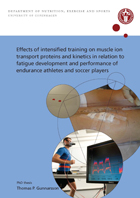PhD defence: Effects of intensified training on muscle ion transport proteins and kinetics
in relation to fatigue development and performance of endurance athletes and soccer players
Thomas P. Gunnarsson
PhD thesis
MUSCULAR FATIGUE – what is causing muscle fatigue during exercise?
The development of muscle fatigue has troubled researchers for more than 100 years. To date we know that different fatigue mechanisms are responsible for fatigue during different types of exercise. During high-intensity exercise, lasting 3-10 min, increases in extracellular K+ has been suggested to reduce muscle fiber excitability leading to fatigue. After a period of intensified training the ability to perform repeated high-intensity exercise improves which is likely related to an increased capacity for maintaining the K+ balance over the muscle membrane, which may be caused by an increase in the maximal Na+/K+ pump capacity.
The present thesis is based on 4 scientific papers which are based on 4 studies including trained runners, cyclists and soccer players.
Papers I-III investigates whether a period of intensified training leads to improvements in the repeated short and long-term performance, and whether this is related to increases in muscle ion transport proteins of importance for the ion homeostasis during exercise, with special emphasis on K+ handling in paper III.
Paper IV investigates muscle glycogen resynthesis in muscle homogenate and single fibers in the days after a soccer match in soccer players ingesting either a carbohydrate and whey protein enriched diet or a normal diet.
2012, 132 pages, 100,- d.kr.,
ISBN 978 87 917 71 50 7
Time
22 November 2012 at 14:00
Venue
Auditorium 1, August Krogh building, Universitetsparken 13, Copenhagen
Opponents
Professor Erik Richter (chair), Department of Nutrition, Exercise and Sports, University of Copenhagen, Denmark.
Professor Ole Bækgaard Nielsen, Aarhus University, Department of Physiology and Biophysics, Denmark.
Professor Jostein Hallén, The Norwegian School of Sport Sciences, Department of Physical Performance, Oslo, Norway.
Supervisor
Professor Jens Bangsbo, Department of Nutrition, Exercise and Sports, University of Copenhagen, Denmark.

